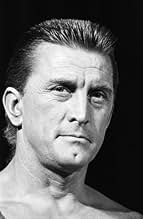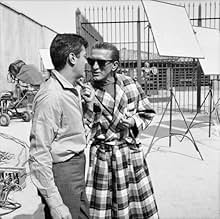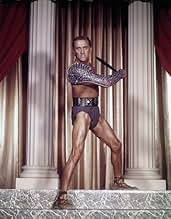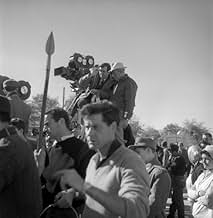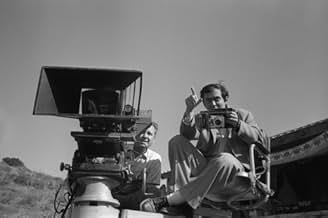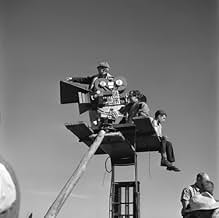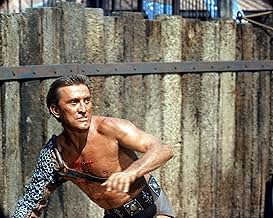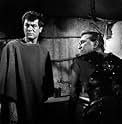El esclavo Spartacus dirige una violenta revuelta contra la decadente República Romana.El esclavo Spartacus dirige una violenta revuelta contra la decadente República Romana.El esclavo Spartacus dirige una violenta revuelta contra la decadente República Romana.
- Dirección
- Guionistas
- Elenco
- Ganó 4 premios Óscar
- 12 premios ganados y 11 nominaciones en total
Resumen
Reviewers say 'Spartacus' is lauded for its epic scale, historical drama, and standout performances by Kirk Douglas, Laurence Olivier, and Peter Ustinov. Key themes include the fight for freedom, class conflict, and human resilience. However, some criticize historical inaccuracies, pacing, and the film's length. Love scenes and certain character arcs receive mixed feedback. Despite these issues, the film's spectacle, cinematography, and ensemble cast performances are widely appreciated.
Opiniones destacadas
10bb_org
A very moving and compelling story of epic proportions. The plot is relentless, propelled by a dazzling screenplay. Kubrick draws some of the greatest performances of the cast, and fills the screen with images that fascinate throughout. Well paced for a movie of this magnitude.
To those who complain of anachronisms and poetic license with historical events, I say to them, 'Remember, it is a movie.' To be truly accurate, the cast would be delivering their lines in Latin and ancient Greek, with English subtitles. Whatever Kubrick might lose with historical inaccuracies, he gains far more in his ability to convey the story to the viewer. Even though it is over forty years old, the film tells us more of the present day than it does of the past.
To those who complain of anachronisms and poetic license with historical events, I say to them, 'Remember, it is a movie.' To be truly accurate, the cast would be delivering their lines in Latin and ancient Greek, with English subtitles. Whatever Kubrick might lose with historical inaccuracies, he gains far more in his ability to convey the story to the viewer. Even though it is over forty years old, the film tells us more of the present day than it does of the past.
As most are undoubtedly aware this is the film that the director virtually expunged from his repertoire. But why did Stanley Kubrick really disown SPARTACUS (1960)? The answer can be summed up in two words: absolute control. Kubrick wanted total administrative as well as artistic authority over the making of the film about a revolt of gladiators and slaves in ancient Rome.
But you will notice that Bryna Productions not only financed SPARTACUS but also an earlier film directed by Kubrick, PATHS OF GLORY (1958). Bryna was Kirk Douglas' film company and, as most filmgoers know, he was the star of both films. Besides having all the money to make the films, Douglas had artistic vision as well. Only three weeks into what would prove to be an incredibly complex and arduous production, Douglas fired venerable director Anthony Mann (RAW DEAL, RAILROADED,THE FURIES, THE NAKED SPUR, THE MAN FROM LARAMIE, MAN OF THE WEST, etc.) from SPARTACUS. With only two days notice, Kubrick was hired to replace him.
Shooting PATHS OF GLORY, Douglas had confined his criticisms and objections to Kubrick's failed rewriting of the script (they went with the original screenplay). Douglas' complaints and artistic influence were far greater on SPARTACUS, much to Kubrick's chagrin. Though the director craved autonomy over every aspect of the film, Douglas would not budge. A tense compromise was reached but ultimately Douglas had the last word. Kubrick saw himself as just a hired gun. And he would never allow himself to be placed in this position again.
Later, both men would complain about the film's outcome and each other. They never made another movie together.
But SPARTACUS is no uneven patchwork of divergent ideas. The film is cohesive and arresting. At the restored version of three hours and eighteen minutes, there is practically no dead footage in the film. Dalton Trumbo's screenplay is surprisingly economical, with sharply drawn characters placed against the sweeping historical majesty and violent sociological tumult of ancient Rome. Quite plainly, the gloriously inventive music by Alex North is among the greatest scores ever written for a motion picture. And despite Kubrick's bad experience, he managed to guide the actors towards creating outstanding work (a best supporting actor Oscar for Peter Ustinov). He even transformed the very real enmity between Laughton and Olivier into an on-screen asset. His other contributions were considerable also (the large scale and power of the battle sequence, for example). In the end, for the film at least, the clash of giant egos proved fortuitous. Recommendations: for greater insight and detail on this and Kubrick's other films I urge you to seek out Jan Harlan's excellent documentary, STANLEY KUBRICK: A LIFE IN PICTURES, and Vincent LoBrutto's exhaustive, highly informative biography, STANLEY KUBRICK. For the producer's views on SPARTACUS and its director, take a gander at Kirk Douglas' very candid autobiography, THE RAGMAN'S SON.
But you will notice that Bryna Productions not only financed SPARTACUS but also an earlier film directed by Kubrick, PATHS OF GLORY (1958). Bryna was Kirk Douglas' film company and, as most filmgoers know, he was the star of both films. Besides having all the money to make the films, Douglas had artistic vision as well. Only three weeks into what would prove to be an incredibly complex and arduous production, Douglas fired venerable director Anthony Mann (RAW DEAL, RAILROADED,THE FURIES, THE NAKED SPUR, THE MAN FROM LARAMIE, MAN OF THE WEST, etc.) from SPARTACUS. With only two days notice, Kubrick was hired to replace him.
Shooting PATHS OF GLORY, Douglas had confined his criticisms and objections to Kubrick's failed rewriting of the script (they went with the original screenplay). Douglas' complaints and artistic influence were far greater on SPARTACUS, much to Kubrick's chagrin. Though the director craved autonomy over every aspect of the film, Douglas would not budge. A tense compromise was reached but ultimately Douglas had the last word. Kubrick saw himself as just a hired gun. And he would never allow himself to be placed in this position again.
Later, both men would complain about the film's outcome and each other. They never made another movie together.
But SPARTACUS is no uneven patchwork of divergent ideas. The film is cohesive and arresting. At the restored version of three hours and eighteen minutes, there is practically no dead footage in the film. Dalton Trumbo's screenplay is surprisingly economical, with sharply drawn characters placed against the sweeping historical majesty and violent sociological tumult of ancient Rome. Quite plainly, the gloriously inventive music by Alex North is among the greatest scores ever written for a motion picture. And despite Kubrick's bad experience, he managed to guide the actors towards creating outstanding work (a best supporting actor Oscar for Peter Ustinov). He even transformed the very real enmity between Laughton and Olivier into an on-screen asset. His other contributions were considerable also (the large scale and power of the battle sequence, for example). In the end, for the film at least, the clash of giant egos proved fortuitous. Recommendations: for greater insight and detail on this and Kubrick's other films I urge you to seek out Jan Harlan's excellent documentary, STANLEY KUBRICK: A LIFE IN PICTURES, and Vincent LoBrutto's exhaustive, highly informative biography, STANLEY KUBRICK. For the producer's views on SPARTACUS and its director, take a gander at Kirk Douglas' very candid autobiography, THE RAGMAN'S SON.
I know my summary may sound opinionated...but I couldn't help being entertained by this film. If I had any complaints it would be there are one or two parts that suffer from uneven pacing and in the latter half especially there are a lot of wordy speeches from Kirk Douglas. That said, it is very well made, with sweeping cinematography, beautiful costumes and well constructed sets. The score is triumphant and bombastic, Kubrick's direction is secure and the script is surprisingly intelligent and knowing. Also the action is brilliantly done, and the performances are to be much applauded, with Kirk Douglas believable and sincere in the title role, Jean Simmons alluring as Varina and Laurence Olivier, Peter Ustinov and Charles Laughton stealing every single scene they are in.
Overall, maybe not Kubrick's very best, but a fine historical epic. 9/10 Bethany Cox
Overall, maybe not Kubrick's very best, but a fine historical epic. 9/10 Bethany Cox
This is Kubrick's farewell to Hollywood. I would have liked to be a fly on the wall. I don't believe for a minute that it was a cordial parting of the ways. I mean, Kubrick never returned, never! With "Paths of Glory" Kubrick gave Kirk Douglas, not just his best part as an actor, but his best movie. By the time Douglas called Kubrick to "take over" "Spartacus" Douglas was already a huge star with too much saying in the matter. Look at it, it's clear. "Spartacus" is more Douglas than Kubrick. Great fun to watch, yes, absolutely. A terrific script by black listed Dalton Trumbo. Some fight sequences unequalled in the history of film. Look at the fight between Douglas and Woody Strode and compare it to the ones in "Troy" or "Gladiator" for that matter. It is sad an embarrassing to realise how low we've fallen. Computer generated images or not. The cast is unbelievable but it's clearly not Kubrick's. The casting of his movies was part of his master plan. He would cast a Ryan O'Neil as Barry Lyndon for instance so he can blend perfectly with the magnificent tapestry, without adding any colours of his own. The same can be said of Keir Dullea, in 2001, a robotic non entity in a showdown with a voice. When he needed actors to be at the very pinnacle of his universe he went to Peter Sellers, Malcolm McDowell or James Mason. Even the casting of Tom Cruise made a lot of sense. He used the star and his wife to talk about the dreamlike powers of betrayal. In "Spartacus" Tony Curtis, plays Antoninus, a teacher of the classics. A campy idea never seen in a Kubrick film, before or since. To be fair, there are some spot on, brilliant pieces of casting. Charles Laughton is, as usual, superb. Peter Ustinov, terrific. Laurence Olivier manages to give a multifaceted portrait of weakness, fear and greed. Jean Simmons makes the reason to survive totally believable. But the cutesy love scene between her and a shiny muscular, coiffed Spartacus is truly terrible. As a final blow, the scene is enveloped in a sticky, corny music theme. Having said all that. Don't you dare missing this epic. I'ts Kubrick's goodbye to Hollywood and like everything else that the master said or do, he really meant it.
The darkest historical epic. No dancing girls, no chariot races, filmed in sombre browns and reds. Nominally directed by Kubrick but Douglas, as a very 'hands on' producer was responsable for the operatic sweep of the film. I was astonished when revisiting the film in 1991 at the cinema at the bravery of the project-to have the hero cry several times, once even out of self pity and with a heart rending ending! The film has depth and weight, the characters are well drawn. The performances are almost flawless, Douglas managing as actor to create tension in each scene-Olivier, not withstanding his eyerolling mannerisms is perfectly cast. The minor parts are richly drawn-gravel voiced Charles McGraw, Herbert Lom and Woody Strode. The cinematography and music are flawless. Only John Dall as a very modern Glaberus and John Ireland as Crixus seem out of place. Ironically, despite the downbeat tone of the film it is impossible to watch it without being uplifted through your tears of compassion. Unofficialy remade as Braveheart...watch one after the other and you'll see the similarities in mood, theme and even the battle choreography. Spartacus would be my 'desert island' movie.
¿Sabías que…?
- TriviaStanley Kubrick was brought in as director after Kirk Douglas had a major falling out with the original director, Anthony Mann. According to Sir Peter Ustinov, the salt mines sequence was the only footage shot by Mann.
- ErroresAntoninus is wearing trousers under his tunic when Tigranes enters the tent saying he arrived on horseback without any slaves. When Spartacus opens the treasure-chest Antoninus is suddenly bare-legged.
- Citas
Herald: I bring a message from your master, Marcus Licinius Crassus, Commander of Italy. By command of His Most Merciful Excellency, your lives are to be spared. Slaves you were and slaves you remain. But the terrible penalty of crucifixion has been set aside on the single condition that you identify the body or the living person of the slave called Spartacus.
Antoninus: [stands up] I'm Spartacus!
[everyone around Antoninus and Spartacus stands up and shouts "I'm Spartacus!"]
- Créditos curiososThe six main cast members are accompanied by an item that represents their character (a chain, a Roman eagle, a wine jug, a couple of hands - one wielding a snake, and a sword).
- Versiones alternativasAfter its premiere the film was heavily cut and wasn't shown in its complete form until 1991, when a restored version was re-released. Among the restored scenes is one where where Marcus Crassus (Laurence Olivier) tries to seduce Antonius (Tony Curtis) in the bath. The soundtrack was damaged, so Anthony Hopkins was called in to dub Olivier's lines. In addition, several scenes of violence preview audiences reacted to negatively were restored, including Crassus bloodily stabbing Draba, Marcellus being drowned in the stew, Spartacus stabbing a Roman soldier in the pool, and several gory shots in the final battle, notably Spartacus lopping off the arm of a Roman soldier.
- ConexionesEdited into Hércules: Los viajes legendarios: Les Contemptibles (1997)
Selecciones populares
Inicia sesión para calificar y agrega a la lista de videos para obtener recomendaciones personalizadas
Detalles
- Fecha de lanzamiento
- País de origen
- Sitio oficial
- Idioma
- También se conoce como
- Spartacus
- Locaciones de filmación
- Hearst Castle, San Simeon, California, Estados Unidos(Crassus' villa)
- Productora
- Ver más créditos de la compañía en IMDbPro
Taquilla
- Presupuesto
- USD 12,000,000 (estimado)
- Total en EE. UU. y Canadá
- USD 1,830,650
- Fin de semana de estreno en EE. UU. y Canadá
- USD 92,162
- 28 abr 1991
- Total a nivel mundial
- USD 1,855,491
- Tiempo de ejecución3 horas 17 minutos
- Color
Contribuir a esta página
Sugiere una edición o agrega el contenido que falta

Principales brechas de datos
What is the streaming release date of Espartaco (1960) in Canada?
Responda



